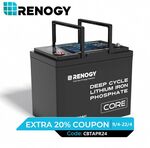Battery Type: Lithium Iron Phosphate
Nominal Voltage: 12.8V
Rated Capacity (0.5C, 25℃): 300Ah
Charge Voltage: 14.4V
Maximum Charge Current: 200A
Maximum Discharge Current: 200A
Cycle Life (0.5C/1C, 25℃): 5000 Cycles (80% DOD, 80% EOL)
Housing Material: ABS
Protection Rating: IP65
Warranty: 5 Years
200Ah and 300Ah batteries are on sale as well





So is it a 100 Ah battery or a 300 Ah battery?
Ah, I see, you've put the price of the 100 Ah battery in the heading, then in the body you've posted the specs of the 300 Ah model. So can we believe anything else in your stated specs?
And in the ebay listing, isn't the claim its 12V/24V/48V just a misunderstanding of the manufacturer's assertion that you can series connect up to 4 of them?
Caveat emptor.